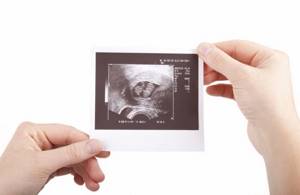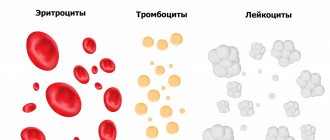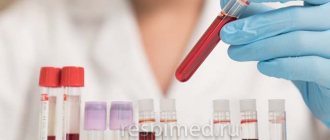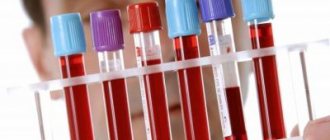ECO
10820 29 July
IMPORTANT!
The information in this section cannot be used for self-diagnosis and self-treatment.
In case of pain or other exacerbation of the disease, diagnostic tests should be prescribed only by the attending physician. To make a diagnosis and properly prescribe treatment, you should contact your doctor. We remind you that independent interpretation of the results is unacceptable; the information below is for reference only.
Human chorionic gonadotropin (hCG, β-hCG, beta-hCG, Human Chorionic Gonadotropin): indications for use, rules for preparing for the test, interpretation of results and normal indicators.
Human chorionic gonadotropin is a hormone produced by the outer membrane of the embryo, and is normally detected in the blood and urine of a woman only during pregnancy.
Human chorionic gonadotropin consists of two subunits - alpha and beta. The beta subunit (β-hCG), used for the immunometric determination of the hormone, is unique. To monitor the course of pregnancy, the determination of the beta subunit of hCG is used. The level of beta-hCG in the blood already on days 6–8 after conception allows one to diagnose pregnancy (the concentration of beta-hCG in the urine reaches the diagnostic level 1–2 days later than in the blood serum).
HCG has a multifaceted effect on the pregnant woman’s body: it affects the development of the embryo and fetus, stimulates the synthesis of estrogens and androgens by ovarian cells, promotes the functional activity of the chorion and placenta, and ensures a successful pregnancy.
The introduction of hCG into the body of non-pregnant women stimulates ovulation and the synthesis of sex hormones necessary for conception. In men, this hormone enhances the formation of seminal fluid and activates the production of gonadosteroids.
In the early stages of pregnancy and until the 2nd trimester, β-hCG supports the production of hormones necessary to maintain pregnancy, and in male fetuses it stimulates the cells responsible for the formation and development of the male reproductive system.
No. 66 Pregnancy monitoring, biochemical markers of fetal condition
Human chorionic gonadotropin (hCG, beta-hCG, b-hCG, Human Chorionic) Synonyms: Beta-hCG general. Human Chorionic Gonadotropin; hCG; Pregnancy Quantitative hCG; Beta hCG; Total beta hCG. Brief characteristics of the substance being determined Human chorionic gonadotropin hCG is a glycoprotein with a molecular weight of about 46 kDa, synthesized in syncytio...
Up to 1 business day
590 RUR
Indications for determining hCG levels in women
- Lack of menstruation (amenorrhea).
- Exclusion/confirmation of pregnancy, including ectopic (ectopic).
- Diagnosis of the condition of the fetus at different stages of pregnancy.
- Assessment of the condition of the placenta at different stages of pregnancy.
- Dynamic monitoring of fetal development during pregnancy, including the diagnosis of malformations.
- Suspicion of the presence of tumor diseases of the reproductive system, such as hydatidiform mole (a rare pathology of the fetal egg, in which instead of the development of the embryo, chorionic villi grow), chorionepithelioma (a malignant tumor developing from the epithelium of the villi of the fetal egg).
- Carrying out artificial termination of pregnancy.
What is hCG
HCG is formed during pregnancy and is responsible for the function of the corpus luteum and a constant increase in the amount of progesterone. The latter, in turn, supports pregnancy, prevents miscarriage, and is classified as a gonadotropin.
The hormone includes the presence of alpha and beta units. Beta has a unique structure. But alpha repeats the composition of some sex hormones. Therefore, experts pay attention specifically to beta indicators. The home diagnostic method using simple tests is based on the detection of beta hCG. But this method is less reliable than conducting laboratory diagnostics for the same substance.
Rules for preparing for a blood test to determine the level of hCG
non-specific: on the eve of the procedure, it is enough to refrain from smoking and drinking alcohol, limit stress and intense physical activity for a week;
Blood donation is carried out on an empty stomach. Determination of hCG in the blood is possible already on the 6-8th day after conception. The use of urinary test systems (rapid pregnancy tests) will be informative starting from the 7th day after fertilization of the egg. To confirm the result, it is recommended to re-determine the hormone level a few days after the first test.
You can take a blood test for hCG (thyroid-stimulating hormone, thyrotropin, Thyroid Stimulating Hormone, TSH) at the nearest INVITRO medical office. A list of offices where biomaterial is accepted for laboratory research is presented in the “Addresses” section.
Reasons leading to high β-hCG levels
- Multiple pregnancy.

- Incorrect timing of pregnancy.

- Pathological pregnancy: the appearance of edema, increased blood pressure, loss of protein in the urine (preeclampsia), convulsions (eclampsia), toxicosis.
- The pregnant woman has chronic diseases (for example, diabetes).
- Multiple malformations of the fetus (in this situation, determination of the level of β-hCG is used together with other indicators, the so-called “triple test”. This study is used as a screening test, and not for making a diagnosis.).
What does the hCG test show?
The concentration of gonadotropin shows how the pregnancy is progressing. Small deviations from the average value are normal, since each woman has her own individual indicators. HCG helps determine:
- developmental defects or delays;
- frozen pregnancy;
- location of the fetus outside the uterus;
- normal embryo development;
- placental insufficiency;
- risk of miscarriage;
- successful curettage (hormone concentration decreases quickly).
By determining the hCG level, the number of living embryos can be calculated. Each of them produces a specific amount of the hormone. There are certain standards by which it is possible to establish not only the presence of a fetus, but also the approximate term (hCG concentration below is indicated in mU/ml).
| 0–5 | no pregnancy |
| 10–21 | 7–9 days from conception |
| 25–156 | early term (approximately 14 days) |
| 101–4870 | 2–3 weeks |
| 1110–31500 | 3–4 weeks |
| 2560–82300 | 4–5 weeks |
If multiple pregnancy is recorded, the concentration of chorionic hormone will be twice as high as the indicated values, the presence of three fetuses will be 3 times higher, etc. An increase in gonadotropin (if there is no embryo) may indicate a possible tumor or its growth. A low concentration of the hormone usually indicates frozen development of the fetus or its ectopic location.
Gonadotropin can be detected not only against the background of certain neoplasms, but also when using hormonal drugs. Then you need to donate blood again after 4-6 days. To obtain accurate answers, if the first study was done in our clinic, then the second one should be carried out here.
The Private Practice Clinic has highly qualified specialists and its own modern laboratory. We offer a professional approach and guarantee high accuracy of analysis results.
Reasons why a decrease in β-hCG levels is recorded
- Incorrect pregnancy dates.
- Ectopic pregnancy.
- Frozen pregnancy.
- Risk of miscarriage.
- Pathologies of the fetus or placenta (including placental insufficiency).
- Intrauterine fetal death (in this case, determining the hormone level in the first and second trimesters is informative).
When performing abortions, the level of β-hCG is also monitored, by the dynamics of its growth/decrease one can judge the completeness of the manipulation performed.
Determining the level of hCG, in addition to establishing the fact of pregnancy in the early stages, is part of the screening examination of pregnant women in the first trimester, along with ultrasound.
HCG - when to take it
Human chorionic gonadotropin (hCG) is a pregnancy hormone that is produced by placental tissue. The level of this hormone increases daily, starting from the moment of conception. Taking into account innovative technologies and many years of experience of pharmacists, an artificial preparation of this hormone was created. It is introduced into a woman’s body in the form of injections. This allows women with menstrual irregularities to achieve ovulation. As a result, the long-awaited pregnancy occurs. Reproductologists from the IVF Center clinic in Vladimir will be able to answer the question: when to take hCG.
HCG injections are an injection of hormonal agents, the main active ingredient of which is human chorionic gonadotropin. These drugs include the following drugs: Pregnil, Profasi, Horagon, Humegon, Choriogonin, Menogon and many others. These drugs ensure the resumption of full ovulation and restoration of the functional activity of the corpus luteum. Normal functioning of the corpus luteum is observed due to the increased level of hCG. This hormone helps restore the ovulation process and increase the activity of the corpus luteum.
At the Vladimir IVF Center clinic, patients can get tested for hCG and undergo all the necessary examinations for infertility treatment.
Using hCG to stimulate ovulation
Typically, an ovulation stimulation regimen includes an injection of hCG in a dose of 5,000 to 10,000 IU. To maintain the normal course of pregnancy, reproductive specialists recommend prescribing human chorionic gonadotropin in a dosage of 1000 to 3000 IU. In this case, the dose of hCG is prescribed to each patient individually. In this case, laboratory indicators of hormonal levels, the size and number of follicles and many other factors are taken into account. Stimulation of ovulation when prescribing gonadotropin drugs must be carefully monitored using ultrasound. This is necessary to prevent ovarian hyperstimulation syndrome.
Indications for prescribing hCG injections:
• These injections are prescribed for sufficient nutrition and full functioning of the corpus luteum. This therapy is recommended up to 12 weeks, when the placenta independently produces human chorionic gonadotropin in sufficient quantities. This treatment method is carried out for a favorable pregnancy. • To form well functioning placental tissue. • As one of the drugs in the ovulation stimulation regimen. It promotes the normal functioning of the corpus luteum and provides good conditions in preparation for pregnancy. • For carrying out reproductive manipulations, including in vitro fertilization.
Absolute indications for injection of human chorionic gonadotropin:
• hypofunction of the corpus luteum; • anovulatory form of infertility; • habitual spontaneous abortion; • threat of miscarriage in early pregnancy; • prevention of premature ovulation during reproductive technologies.
Situations in which the administration of hCG by injection is contraindicated:
• absence of gonads during radical operations; • onset of premature menopause; • breast-feeding; • tumor-like formations of the pituitary gland; • malignant formations of the ovaries; • complete obstruction of the fallopian tubes; • hypofunction of the thyroid gland; • intolerance to one of the components of this drug; • chronic adrenal insufficiency; • increased production of prolactin.
The effect of hCG on the course of pregnancy
This hormone is produced starting from the stage of self-implantation of the embryo during natural conception or from the implantation of the embryo during IVF into the uterine cavity. It continues to be produced and accumulated until delivery. If there is a positive urine test for hCG, pregnancy can be diagnosed. Earlier and more accurate indicators can be obtained by examining venous blood for hCG. In the uterine form of pregnancy, this hormone will accumulate in the body of a pregnant woman every day. If the level of this hormone is reduced for a certain week of pregnancy, one may suspect an ectopic form of pregnancy, fetal fading, or the threat of spontaneous miscarriage. Thanks to a highly sensitive express urine test, pregnancy is confirmed already at 4-5 weeks, and when donating venous blood, the presence of conception can be seen already after a two-week delay.
HCG - when to take it
There are two main indications for prescribing an hCG test:
• confirmation or refutation of the diagnosis of pregnancy; • diagnosis of abnormalities during pregnancy.
Testing for hCG is done using test strips that identify the level of this hormone in the urine or by drawing venous blood. The hCG blood test is more accurate than a traditional pregnancy test. It allows you to diagnose pregnancy several days earlier than test strips. Subsequently, the dynamics of the hCG level will show whether the pregnancy is developing normally or not.
HCG is a component of a double or triple screening test that is performed at 10 and 15 weeks of pregnancy. This analysis makes it possible to determine the presence of hereditary abnormalities in the development of the child. Determination of hCG levels is used to diagnose miscarriage and ectopic pregnancy. During a miscarriage, the level of this hormone decreases compared to the norm, and during an ectopic pregnancy, it increases more slowly than usual.
The main role of human chorionic gonadotropin
Thanks to this hormone, a favorable course of pregnancy is maintained, and the level of female sex hormones (estrogens) and the pregnancy hormone (progesterone) is maintained. Violation of the production and accumulation of hCG can cause inadequate supply of food to the organs and tissues of the fetus. This leads to pathological conditions of the metabolic system. For these disorders, this hormone is administered artificially in the form of hCG injections.
Time frame for prescribing hCG injections:
1. When confirming pregnancy, if a woman has a history of more than three miscarriages in the early stages, she needs to be given an hCG injection no later than two months into her pregnancy. Reproduction specialists recommend such injection therapy up to 3.5 months of pregnancy. 2. With clinical symptoms of spontaneous abortion in the early stages. Thus, a hCG injection is prescribed to a woman during the first three months of pregnancy. 3. When carrying out reproductive technologies, when the follicles have reached a certain size. This injection is administered once immediately after the required follicle size is detected. After this, ovulation occurs within 48 hours. To achieve the desired result, the married couple is recommended to have intimate intimacy 24 hours before and after the injection.
Rules for conducting ovulation tests after an hCG injection
Artificial ovulation occurs two days after the injection of hCG. After ovulation has occurred, reproductive specialists recommend taking progestin preparations containing natural progesterone. In case of male infertility, the doctor prescribes a specific time frame and frequency of sexual contacts. If spermatogenesis is normal, then sexual intercourse is recommended at least once every two days.
When to test for ovulation after an hCG injection
The specific day for an ovulation test depends on your menstrual cycle. With a regular, ongoing cycle, testing begins on the seventeenth day before the start of the next period. For example, if the cycle duration is 28 days, then it is recommended to start the test from the eleventh day. If a woman experiences significant fluctuations in cycle length, then the shortest duration over the last six months is selected for calculation. This is what is taken to clarify the time of the ovulation test.
If a woman has serious menstrual irregularities, for example, delays of more than 1 month, ovulation tests are not performed given their high cost. Therefore, in this situation, follicles and ovulation should be monitored by other methods, for example, ultrasound. Reproductologists recommend starting to use tests every day, starting from the moment a certain size of follicle is detected by ultrasound. The borderline size is considered to be a diameter of 20 mm.
You can ask all your questions and make an appointment at the IVF Center by calling or filling out the appointment form on the clinic’s website.
What is HCG used for?
Thanks to human chorionic gonadotropin, the corpus luteum remains functional until the placenta begins to produce hormonal substances on its own. Normally, the corpus luteum exists only for 14 days in each menstrual cycle. During the period of bearing a child, it does not dissolve precisely due to the release of hCG.
Functions of this hormone:
- providing conditions for proper implantation of the embryo and the formation of the chorionic membrane;
- gradual adaptation of a woman to bearing a fetus;
- maintaining a calm state of the immune system, which perceives the fetus as a foreign body;
- maintaining the functionality of the placenta and the high quality of its nutrition;
- increase in the number of chorionic villi.
What are the tests for human chorionic gonadotropin?
To test for hCG, you can take blood or urine. Blood is taken from a vein. If the doctor has prescribed a urine test, you need to collect the first morning portion, approximately 60 ml.
Urine tests are less accurate. For example, they can show pregnancy only when the concentration of the hormone in the blood becomes high enough, usually not earlier than 12–14 days after fertilization.
The analysis for human chorionic gonadotropin can be qualitative or quantitative. Quantitative testing is less precise: it only shows whether hCG is present in the sample. The result can be "positive" or "negative".
During a quantitative analysis, the level of human chorionic gonadotropin is determined. Normally, its concentration in the blood of men and non-pregnant women is no more than 5 IU (international units) per liter. By 13–16 weeks after conception (approximately 15–18 weeks from the start of your last period), its concentration rises to a maximum of approximately 200,000 IU per liter.
How accurate is the hCG test? Are there mistakes?
False-positive results are those when the test mistakenly detects an elevated level of hCG, false negatives are when a negative result is mistakenly obtained, although in fact the level of the hormone is elevated. Unfortunately, sometimes errors occur, but modern equipment allows us to minimize their likelihood.
Some external factors may affect the result of the analysis:
- Taking certain medications. Diuretics, promethazine, anticoagulants (heparin), sleeping pills, antipsychotic drugs, and anti-nausea drugs can distort the result. You should tell your doctor in advance about all the medications you are taking.
- HCG injection. This procedure is sometimes used to treat infertility. After the injection, elevated levels of human chorionic gonadotropin remain for several days.
- Miscarriages and abortions. After this, the hormone level remains elevated for about 4 weeks.
- Analysis in early pregnancy. The required amount of hCG simply does not have time to accumulate in the blood or urine.
- Incorrect urine collection. The results will be distorted if urine is collected in the middle of the day if blood, soap or other substances have entered the container.
- Various laboratories. In different places, the analysis can be carried out differently, the results and standards vary.
Dear patients! If you require a urine test, please bring the prepared material in a container with you. Due to the difficult epidemiological situation, collecting urine samples in the clinic is prohibited. A container for collecting urine can be purchased at any pharmacy.
When does hCG begin to be produced during pregnancy?
HCG levels during pregnancy begin to rise rapidly as soon as the fertilized egg is implanted into the uterus. This usually occurs about ten days after conception. In the first weeks, you may not even be aware of your condition, since obvious symptoms of pregnancy may not yet appear. Some women notice traces of implantation bleeding. It occurs when the fertilized egg attaches to the lining of the uterus. This is an absolutely natural phenomenon that does not pose any danger. This discharge may resemble a moderate period.
Why is hCG elevated?
In non-pregnant women, hCG is negative or not more than 5 mU/ml. With a slight increase in the hormone to 10-150 mU/ml, pregnancy can be suspected (the first 2-3 weeks).
But there are other reasons for an increase in hCG levels that are not related to pregnancy:
- tumor diseases;
- hydatidiform mole;
- chorionic carcinoma.
If hCG is elevated, this indicates an incorrect determination of the gestation period or the development of several fetuses at once. Also, a high level of the hormone often indicates the progression of preeclampsia, gestational diabetes mellitus.






